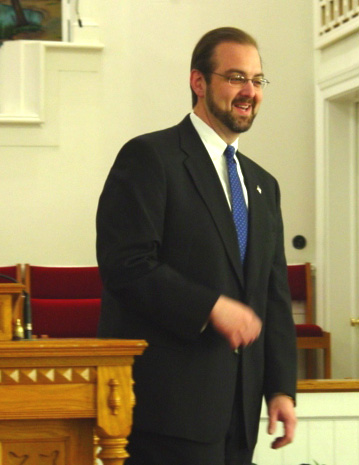
GRANITEVILLE, S.C. (BP)–A cleanup crew was dusting, vacuuming, waxing and doing everything in their power on Saturday, Jan. 22, to make sure First Baptist Church in Graniteville, S.C., was adequately ready.
On Sunday, First Baptist members looked as if life was beginning anew at the church on that sunny yet cold morning after the upheaval in the town of 5,400 caused by a train wreck just 175 to 200 yards from the church and parsonage that killed nine people in the early morning hours of Jan. 6.
Grady “Buddy” Friday, the local assistant fire chief, and other First Baptist members said there was “no place like home” as they returned to the church building after it had been closed for just over two weeks by the contamination. As Friday put it, citing Dorothy from the “Wizard of Oz,” “Just click your heels three times because this is home.”
The train wreck occurred shortly before 2:40 a.m. Jan. 6 when a northbound Norfolk Southern freight train with two locomotives and 42 rail cars struck a locomotive and two rail cars parked parallel to the main rail line. Two of the rail cars sprung a leak and unleashed 70 tons of chlorine on Graniteville, necessitating the evacuation of everyone within a one-mile radius. In addition to the nine deaths, including the train engineer, more than 250 people were sickened by the chlorine leak.
“Ninety percent of our church was in the one-mile evacuation zone and were evacuated from their homes,” said First Baptist pastor Steve Hendricks. “Miraculously, nobody was hurt badly. We count ourselves very blessed.”
One member of First Baptist, Houston Holley, a retired chemical plant electric management supervisor, resides only 10 yards away from the accident site.
After hearing what he described as a loud, crunching sound, Holley went to his window to see if anything was wrong outside. “I could see lots of fog and the chemicals rolling towards me,” he recounted. “I knew it was an abnormal thing, but I did not realize what it was.”
Holley stayed around for 10 minutes but the chlorine began penetrating his house and the odor became unbearable. “I ran to the car as it was getting worse and I drove off towards Aiken,” about five miles to the west. Holley spent more than two weeks in a motel before being allowed to return home Jan. 21.
Hendricks was made aware of the situation soon after the wreck by church secretary Kathy Friday, Grady’s wife. At first, Hendricks thought her call was another pastor-related need to be met.
At that point, Kathy only knew there were reports of noxious fumes, but she called mainly to put Hendricks and his wife and two children on alert, especially since their 19-month-old, Louis, has asthma.
Hendricks said he and his family smelled the odor of bleach, but at first still did not know what to make of what was happening.
The defining point for the Hendrickses to leave the area was when Grady Friday, a strong, burly man, was on the phone telling the pastor in an uncharacteristically trembling voice to grab his family and get out.
“We were out in two minutes after that because that shook me up,” Hendricks recounted. “I found out later that he told his wife shortly after that to pack a bag, stay by the phone and get ready to run. I am going to see if I can save some lives.”
Reflecting back on the events, Hendricks said the most important thing he has seen happen is that it has opened people’s eyes to the spiritual side of things.
“People on their death bed do not regret the money that they made or did not make, or the things that they bought or had,” Hendricks said. “What they do regret is the relationships in their lives that they let get by. Everybody was focusing on those relationships after this, especially their relationships with God.”
–30–

















